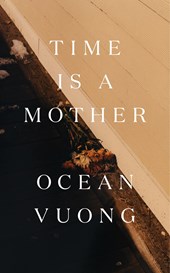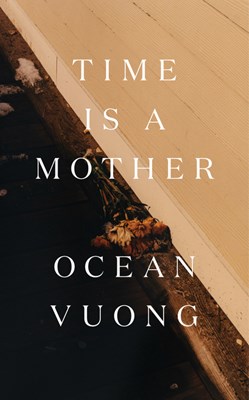Time is a Mother
April 08, 2022
Newly published in the first week of national poetry month, Time is a Mother is an emotionally full and truthful collection of grief, progress, and identity.
Time is a Mother by Ocean Vuong, Penguin Press
The increasing percentage of mask-optional social experiences makes the world feel more post-pandemic than it has in years. This doesn’t erase the hardships we have waded through and the lasting issues we continue to battle, but this time of hopefulness gives us a counterbalance to grief, letting us more fully feel sadness. And I personally feel much more present when I can feel sadness, which is why I’m eager to recommend Ocean Vuong’s new book of poetry Time is a Mother and Porchlight’s upcoming livestreamed conversation with Susan Cain on her new book Bittersweet. Cain’s affection for sadness as much as joy is so refreshing to read about, and her perspective is one that I and, I think, author Ocean Vuong share. As Cain writes:
We’re often taught to focus on our strengths, not our weaknesses. But we shouldn’t confuse a bittersweet temperament, or a ‘negative’ emotional state such as sadness, with weakness. Indeed, some of our most self-aware leaders face their sorrows, limitations, and temperaments head-on–and learn to integrate them into a fuller self.
Vuong exemplifies one of those self-aware leaders in his latest poetry collection. Shortly after publishing On Earth We’re Briefly Gorgeous, his mother’s passing urged him to return to poetry. And in this safe space, he sculpts meaning out of his past, building it into a stronger present and more hopeful future. However, loss persists, but the author does not turn away. In an interview with NPR about his work, Vuong asserts, “I don't think it's a burden to look at everything that is human, the joys and the difficulty.”
In Time is a Mother, readers follow Vuong on a 100-page journey through childhood innocence to coming-of-age exploration and the processing of identity on a larger scale–contending with America’s history of racism, war, and politics. Vuong nimbly splices pleasure and sorrow, crafting full moments of emotion with sparse text amplified by the reader's own experiences.
He ebbs and flows in and out of his own body in this collection. Some poems begin grounded in a moment and spiral outward into metaphysical territory. Scenes dissolve line by line into distress.In “Nothing,” Vuong and his partner shovel snow back-to-back. This scene blends into the story of his partner’s grandmother fleeing Russia, and Vuong muses on how war can do so much damage, and yet there is someone who walks out the other side, alive and content (enough).
A recurring subject is writing itself: how Vuong was mocked for pursuing it (“I used to cry in a genre no one would read”) how it can transport him to a vivid past (“all I have to do is write the right words & I’m beside you (again)”), how it can redefine the past (“I did it to hold my father, to free my dog. It’s an old story, Ma. Anyone can tell it.”), how it defines him (“I’m sorry for being useful only in language”), and how it can hold us back:
...this family
of ants fossilized
on the page you slam
the book shut look out
at the leafless trees
doused in red April rain
where none of us
are children long enough
to love it.
His mother is, of course, another recurring presence, though curiously she doesn’t appear as a main character in any poem. He writes to her in “Dear Rose,” sharing a few of her stories but ultimately, he shirks nostalgic memories in favor of coming to terms with life without her and transitioning power to his readers and his words to support him.
Vuong’s latest poetry collection could be described as vulnerable, but I think I would rather call it truthful–because truth is often deemed more valuable than emotional openness. It is both true to his personal identity and to the larger experiences of grief and of existence in America as a queer immigrant. His poems make space for many disconsolate readers to see themselves and openly feel both sorrow and happiness.
’cause I’m a cold man
Who believes every bit
Of warmth should be saved
& savored.
Time is a Mother is truly a valuable addition to expanding our empathy and compassion for ourselves and others, and a call to embrace bittersweet existence.




